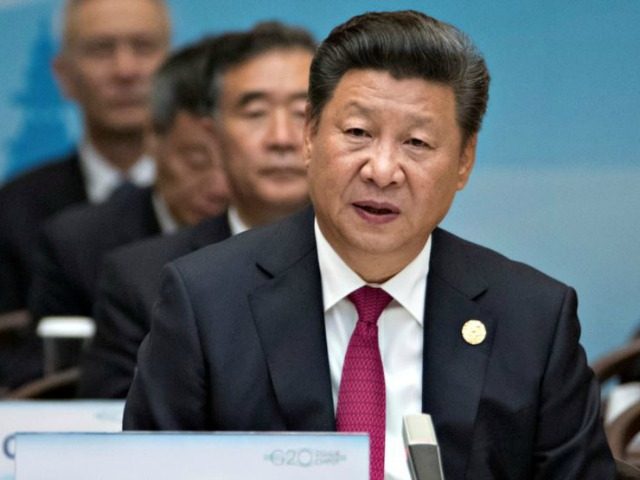Chinese state-run media outlets have taken to comparing President Xi Jinping to communist dictator Mao Ze Dong, arguing that China needs a “strongman” to propel it to the status of global superpower as Xi prepares to assume the title of “core” Communist Party leader.
“China needed a strongman politician so the nation could again rise to greatness amid a time of strategic challenges and risks,” a column in the Peoples’ Tribune, which The South China Morning Post describes as “affiliated with party organ People’s Daily,” said of Xi last week. The article goes on to declare: “China needs a leader like Mao and Xi fits the bill.”
The People’s Tribune article was published ahead of the sixth plenary session of the Communist Party of China’s Central Committee, in which the party is expected to appoint Xi its “core” leader. Only two other post-communist Chinese leaders, Mao and Deng Xiaoping, have been given the title, with Xi predecessors like Hu Jintao only achieving a title as “first among equals” in the seven-person Communist Party leadership committee, not “core” leader expected to unilaterally lead the Communist Party. The Asia Times explains:
The concept of “core” leader was formulated by Deng in the 1990s. Although the party’s central leadership was a collective body, there was a “core” leader to head this leadership, he said, adding that Mao was the “core” leader of the CPC’s first-generation leadership and he himself the “core” leader of the second-generation leadership.
India’s Zee News suggests that Xi may be looking to “amend the party structure to continue beyond the 10 year period stipulated by the party,” to stay in power for longer than his current term, which ends in 2022.
Xi has endeavored during his tenure to promote the legacy of Mao, under whose leadership at least 45 million Chinese were killed in purges, or by prison torture, famine, common illnesses, and other practices and phenomena prevalent in communist dictatorships. Xi has used Maoist language, instituting a “mass line” Party discipline campaign in 2014 to eradicate “corrupt” communist officials from the ranks of the party and arresting hundreds of high-ranking officials in mass raids throughout the past four years. This year’s Communist Party session is dedicated to increasing “strict party governance,” according to the state-run Global Times, with “discipline” as arguably the most cherished virtue of Xi’s tenure.
Under Xi, China has seen the opening of several new museums and museum exhibits dedicated to Mao’s rule. Chinese youth are increasingly bombarded with propaganda promoting both Xi and Mao, including rap videos praising the Communist Party. Commemorating the anniversary of the “Long March” this week – an event in which communists claim their army marched 6,000 miles in 1934 – the People’s Daily wrote an article noting that Chinese youth today were not hardened by the suffering of war. This is presented as a negative attribute of China today.
“The Long March is the glory of the people’s army, and the honorable people’s army must always carry forward the great spirit and fine tradition of the Red Army in the Long March,” Xi is quoted as saying in an hour-long speech last week, anticipating his ascent to strongman leader in this week’s party session.
“Today’s younger generation is fragile under pressure and gives up more easily. However, their worries sound like nothing compared to what the Red Army soldiers suffered and overcame,” says a museum curator. The article notes that Xi has commissioned a “documentary” series targeted Chinese millennials on the Long March.

COMMENTS
Please let us know if you're having issues with commenting.